Transforming Gardens: Landscape Gardening in Raynes Park
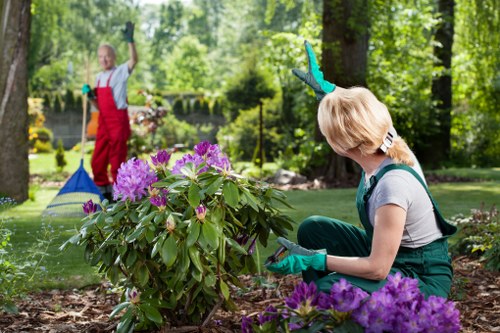
Introduction to Landscape Gardening in Raynes Park
Landscape gardening is an art that combines creativity, practicality, and sustainability to create beautiful outdoor spaces. In Raynes Park, a vibrant suburban area in South West London, landscape gardening plays a crucial role in enhancing the local environment and residents' quality of life.
Whether you have a sprawling backyard or a compact terrace, landscape gardening can transform your outdoor area into a serene oasis. This article explores the various aspects of landscape gardening in Raynes Park, offering insights and tips for both beginners and seasoned gardeners.
From selecting the right plants to designing functional outdoor spaces, understanding the unique characteristics of Raynes Park's climate and soil is essential for successful gardening. Let's delve into the essentials of landscape gardening in this charming London suburb.
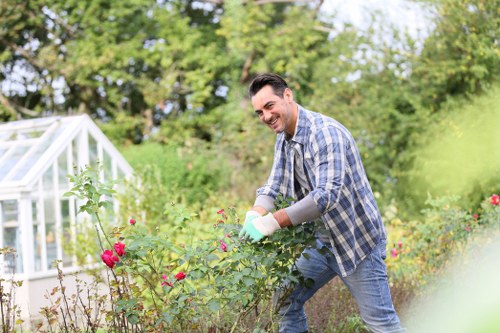
Understanding the Raynes Park Climate
Raynes Park benefits from a temperate maritime climate, characterized by mild winters and cool summers. This climate is ideal for a wide variety of plants, allowing gardeners to experiment with diverse flora.
The average annual rainfall in Raynes Park is moderate, ensuring that gardens receive sufficient moisture without excessive waterlogging. However, it's important to consider proper drainage solutions to prevent water accumulation, especially during heavy rains.
Sunlight exposure is another critical factor. Most parts of Raynes Park receive ample sunlight, but some areas may be shaded due to nearby buildings or mature trees. Understanding these light patterns helps in selecting appropriate plant species that thrive in specific conditions.
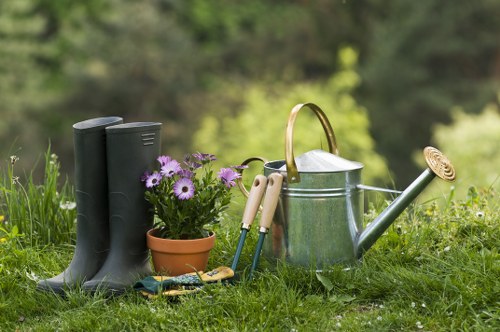
Choosing the Right Plants for Your Garden
Selecting the right plants is fundamental to successful landscape gardening. In Raynes Park, gardeners have access to a diverse range of plant species, both native and exotic.
Native Plants
Native plants are well-adapted to the local climate and soil conditions, making them a sustainable choice. They often require less maintenance and are more resilient against pests and diseases.
Benefits of Native Plants:
- Low maintenance
- Supports local wildlife
- Eco-friendly
Examples of native plants suitable for Raynes Park include lavender, foxgloves, and English ivy.
Exotic Plants
Exotic plants add diversity and unique aesthetic appeal to gardens. While they may require more care, their vibrant colors and unusual forms can create stunning focal points.
Popular exotic plants for Raynes Park gardens include Japanese maples, hydrangeas, and bougainvillea.
Tip: When incorporating exotic plants, ensure they are compatible with the local climate or provide necessary protection during adverse weather conditions.
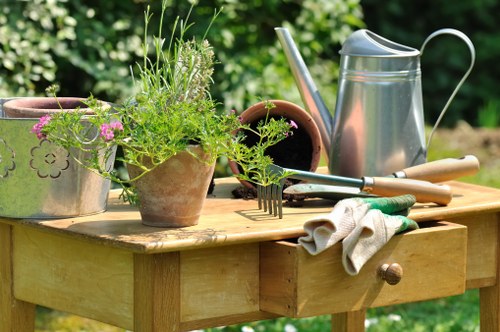
Designing Functional Outdoor Spaces
Effective landscape gardening involves thoughtful design that balances aesthetics with functionality. In Raynes Park, gardeners can create versatile outdoor spaces tailored to their lifestyles.
Patio and Deck Areas
Patios and decks provide excellent venues for relaxation and entertainment. Using durable materials like stone, wood, or composite decking can enhance both the look and longevity of these structures.
Furniture and Decor:
- Comfortable seating
- Weather-resistant cushions
- Decorative lighting
Incorporating elements like pergolas or umbrellas can offer shade and add a stylish touch to your patio or deck.
Garden Paths and Walkways
Paths guide movement through the garden and highlight key features. Materials such as gravel, paving stones, or mulch can be used to create inviting walkways.
Ensure that pathways are wide enough for easy navigation and consider integrating curves or bends to add visual interest.
Pro Tip: Use edging materials to define path boundaries and prevent plant encroachment.
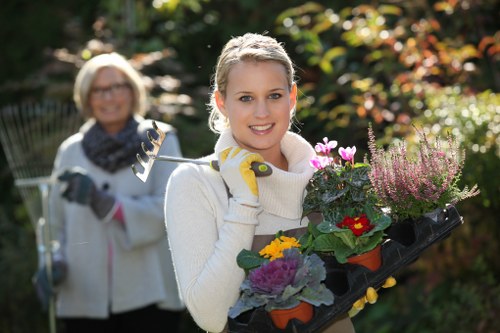
Sustainable Gardening Practices
Sustainability is a key consideration in modern landscape gardening. Implementing eco-friendly practices not only benefits the environment but also enhances the garden's resilience.
Water Conservation
Efficient water use is essential. Installing rainwater harvesting systems or using drip irrigation can significantly reduce water consumption.
- Rain barrels to collect runoff
- Drip irrigation for targeted watering
- Mulching to retain soil moisture
Composting and Soil Health
Maintaining healthy soil is the foundation of a thriving garden. Composting organic waste enriches the soil with essential nutrients, promoting robust plant growth.
Benefits of Composting:
- Reduces landfill waste
- Improves soil structure
- Enhances nutrient content
Regularly adding compost or organic matter to the soil helps in creating a fertile and sustainable garden ecosystem.
Action Required: Start a compost bin today to contribute to a healthier garden and environment.

Incorporating Hardscapes and Softscapes
A balanced garden features both hardscapes (non-living elements) and softscapes (living elements). This combination adds depth and variety to the landscape.
Hardscapes
Hardscapes include features like patios, walkways, fences, and water features. They provide structure and functionality, creating defined spaces within the garden.
Popular Hardscape Features:
- Retaining walls
- Fire pits
- Garden sculptures
Choosing materials that complement the overall garden design ensures a cohesive look.
Softscapes
Softscapes encompass plants, trees, shrubs, and flowers. They introduce color, texture, and life to the garden, making it inviting and vibrant.
Design Tip: Layering plants of different heights and colors can create a visually appealing and dynamic garden space.
Let’s Get Creative: Experiment with various plant combinations to find what best suits your garden’s personality.

Seasonal Gardening Tips for Raynes Park
Maintaining a beautiful garden requires adapting to the changing seasons. Each season offers unique opportunities and challenges for landscape gardening.
Spring
Spring is the perfect time to plant new flowers and vegetables. It's also an ideal time for garden clean-up and preparing beds for the growing season.
Spring Tasks:
- Planting bulbs for summer blooms
- Pruning shrubs and trees
- Applying mulch to retain moisture
Summer
Summer gardens thrive with proper watering and maintenance. Regular weeding and pest control ensure plants remain healthy and vibrant.
Tip: Water plants early in the morning to minimize evaporation and fungal growth.
Autumn
Autumn is the time for harvesting, planting perennials, and preparing the garden for winter. Clearing fallen leaves and adding compost can enrich the soil.
Autumn Activities:
- Planting trees and shrubs
- Collecting and composting leaves
- Protecting plants from frost
Winter
During winter, focus on garden maintenance tasks such as pruning and planning for the next season. Protect sensitive plants by using covers or cold frames.
Pro Tip: Use winter-friendly plants to ensure your garden remains attractive year-round.

Hiring Professional Landscape Gardeners in Raynes Park
While DIY gardening can be rewarding, hiring professional landscape gardeners can elevate your garden to new heights. Professionals bring expertise, experience, and access to quality materials.
Benefits of Professional Services:
- Customized garden designs
- Efficient project execution
- Access to exclusive plant varieties
Professional gardeners can help with everything from initial design to ongoing maintenance, ensuring your garden remains beautiful throughout the year.
Choosing the Right Professional:
- Check credentials and experience
- Review portfolios and previous work
- Read customer reviews and testimonials
Call to Action: Contact us today to schedule a consultation with top landscape gardening experts in Raynes Park.

Common Challenges in Landscape Gardening
Gardening in Raynes Park, like any other area, presents its own set of challenges. Understanding these obstacles can help in devising effective solutions.
Pest Control
Pests can damage plants and disrupt the garden's harmony. Implementing integrated pest management (IPM) strategies can mitigate these issues sustainably.
- Use of natural predators
- Organic pesticides
- Regular monitoring and maintenance
Soil Quality
Poor soil quality can inhibit plant growth. Conducting soil tests and amending the soil with organic matter can enhance fertility and structure.
Soil Improvement Tips:
- Adding compost or manure
- Using green manure crops
- Implementing crop rotation
Climate Adaptation
Extreme weather conditions can affect garden health. Selecting resilient plant species and providing adequate protection can help gardens withstand climatic stresses.
Solution: Choose drought-tolerant plants and install windbreaks to protect against strong winds.
Stay Prepared: Regularly update your gardening strategies to adapt to changing weather patterns.

Maximizing Space in Small Gardens
Many residents in Raynes Park have limited outdoor space. However, with creative planning, even small gardens can be transformed into lush, functional areas.
Vertical Gardening
Vertical gardens utilize walls, fences, and trellises to grow plants upwards, maximizing space and adding visual interest.
- Use of hanging planters
- Installing vertical trellises for climbing plants
- Incorporating wall-mounted shelves for potted plants
Multi-functional Furniture
Choosing garden furniture that serves multiple purposes can optimize space usage. Benches with storage or foldable tables are excellent examples.
Space-Saving Ideas:
- Use of compact seating options
- Incorporating retractable awnings
- Installing built-in storage solutions
Innovative Design: Utilize mirrors and light-colored surfaces to create an illusion of more space.
With thoughtful design and smart choices, small gardens in Raynes Park can be both beautiful and practical.

Enhancing Garden Lighting
Proper lighting is essential for extending garden use into the evening and highlighting key features. In Raynes Park, a variety of lighting options can enhance the beauty and functionality of outdoor spaces.
Types of Garden Lighting
There are several types of garden lighting, each serving a different purpose:
- Pathway lights for safety and navigation
- Spotlights to highlight architectural features
- Ambient lighting for creating a cozy atmosphere
Energy-Efficient Options:
- Solar-powered lights
- LED lighting
- Motion-sensor lights
Pro Tip: Use timers and smart controllers to manage lighting efficiently and reduce energy costs.
Designing with Light
Strategically placed lighting can transform the garden's appearance after dark. Consider the following design elements:
- Layered lighting for depth
- Accent lighting for focal points
- Fairy lights for whimsical touches
Call to Action: Book your service now to upgrade your garden lighting with our expert solutions.

Incorporating Water Features
Water features add a soothing element to gardens, creating a sense of tranquility and enhancing the overall ambiance. In Raynes Park, there are various water feature options to suit different garden styles.
Types of Water Features
- Ponds and koi pools
- Fountains and waterfalls
- Birdbaths and small streams
Benefits of Water Features:
- Attracts wildlife
- Provides a focal point
- Creates relaxing sounds
Maintenance Tips: Regularly clean and maintain water features to prevent algae growth and ensure proper functioning.
Design Considerations
When incorporating water features, consider the garden's overall design, available space, and budget. Ensure that the chosen feature complements the existing landscape and integrates seamlessly with other elements.
Design Idea: Combine a small fountain with surrounding flower beds for a harmonious look.

Planting for Year-Round Appeal
A garden that looks attractive in every season requires careful plant selection and planning. In Raynes Park, gardeners can achieve year-round appeal by choosing a mix of evergreen and seasonal plants.
Evergreen Plants
Evergreen plants retain their foliage throughout the year, providing continuous structure and color. They are essential for maintaining garden interest during the winter months.
- Boxwood hedges
- Holly bushes
- Rhododendrons
Seasonal Blooms
Incorporating plants that bloom in different seasons ensures constant color and variety. Spring bulbs, summer perennials, autumn foliage, and winter berries can create a dynamic and ever-changing garden.
Plant Suggestions:
- Spring: Tulips, daffodils
- Summer: Roses, lavender
- Autumn: Chrysanthemums, ornamental grasses
- Winter: Poinsettias, winter heathers
Pro Tip: Plan your garden layout to allow for staggered blooming periods, maximizing visual interest throughout the year.
Call to Action: Contact us today to design a garden that flourishes in every season.

